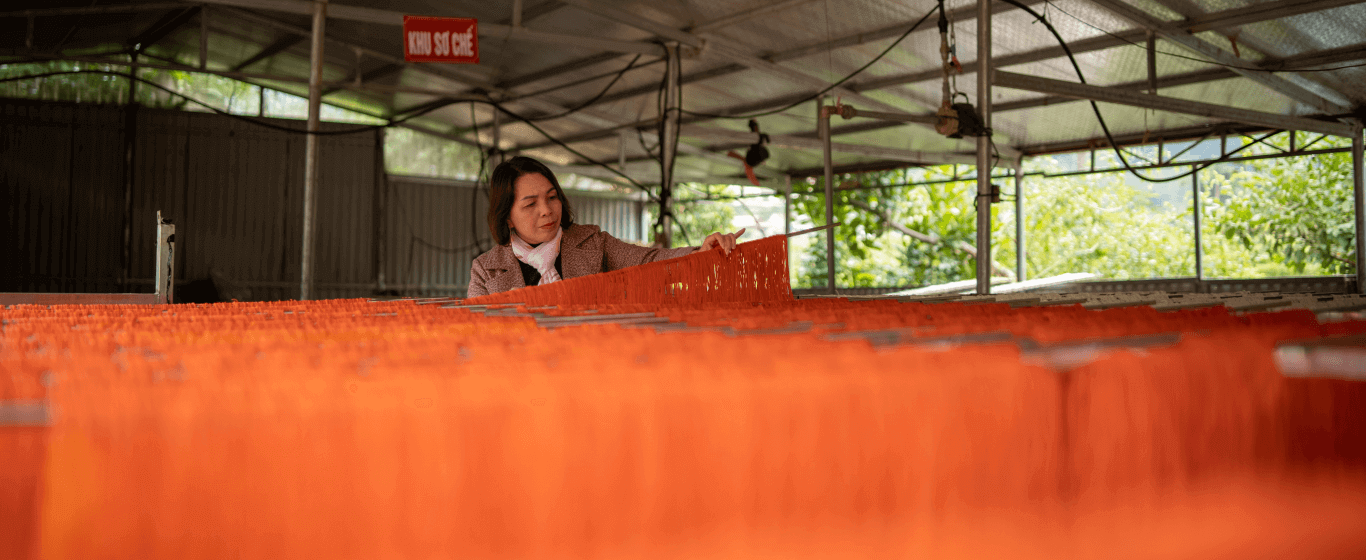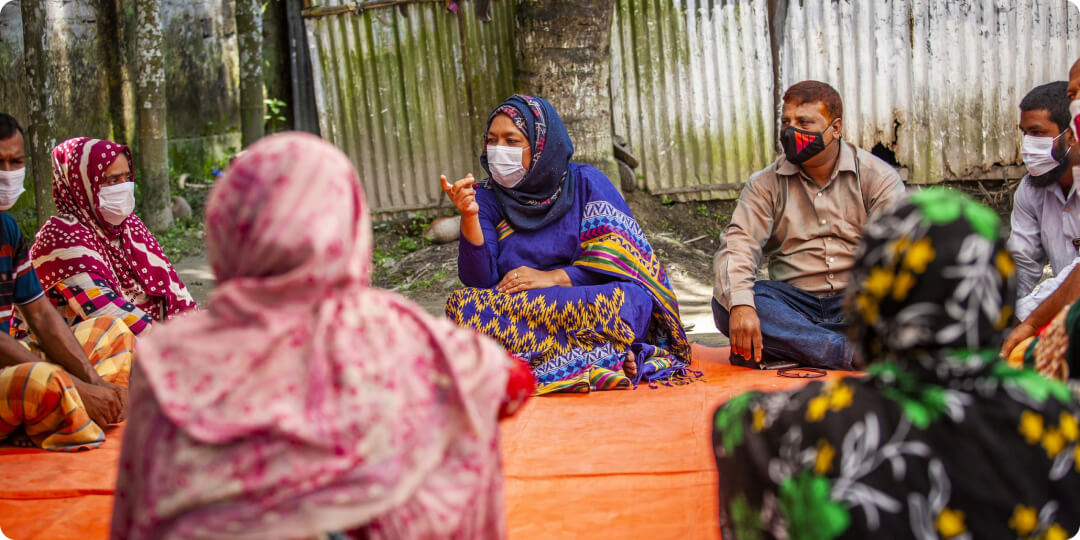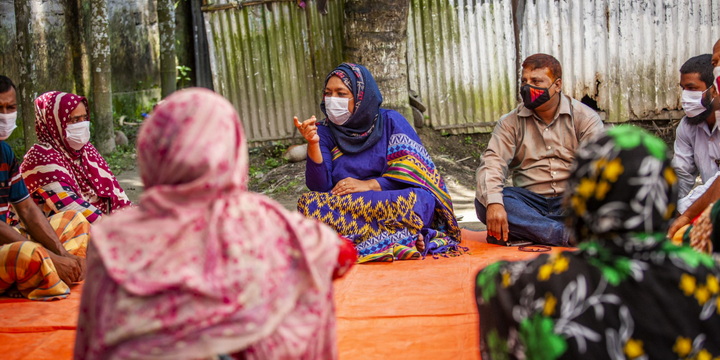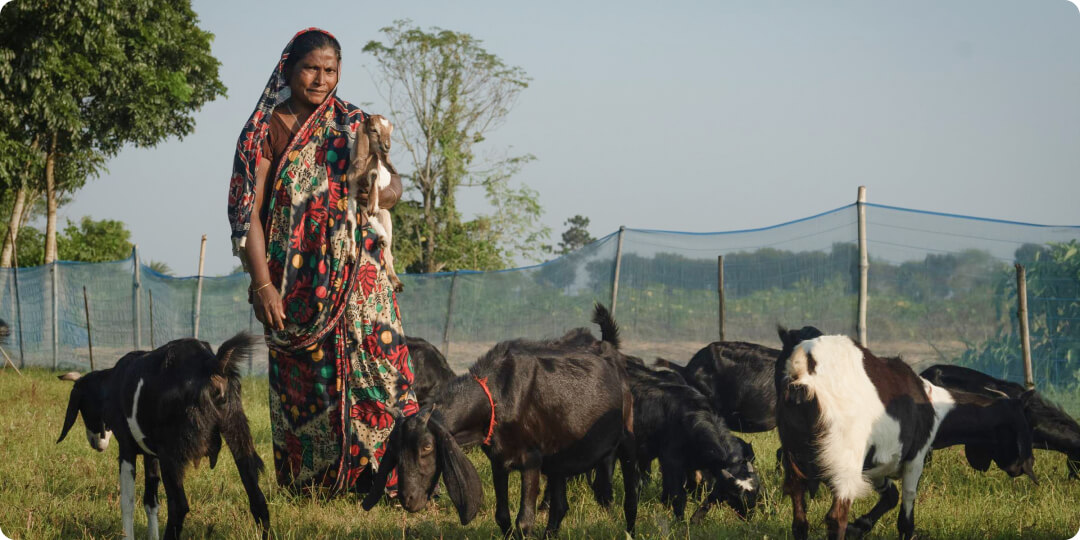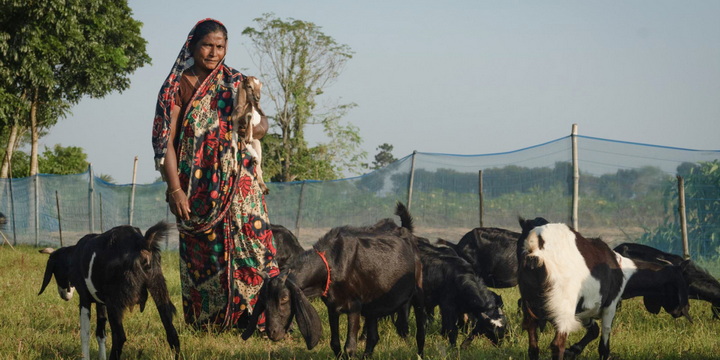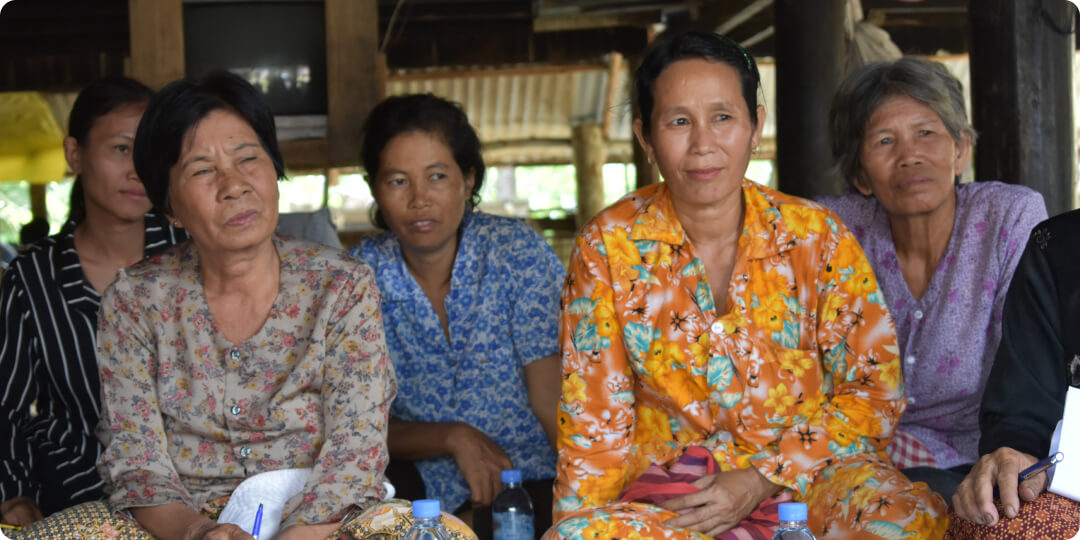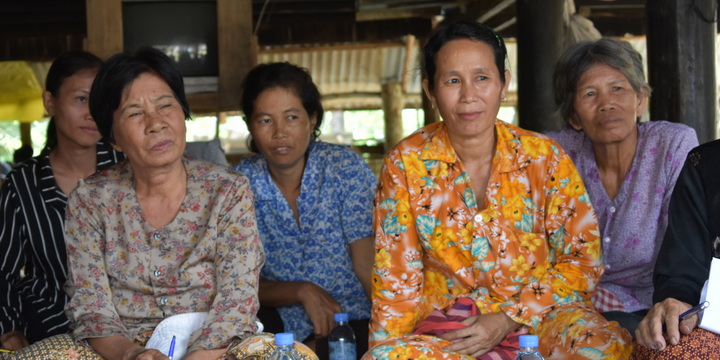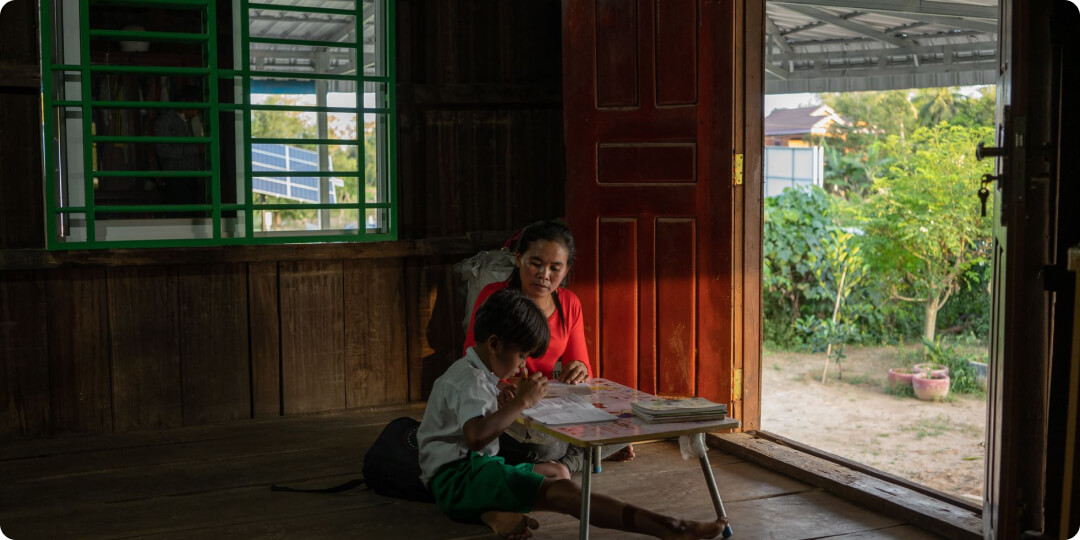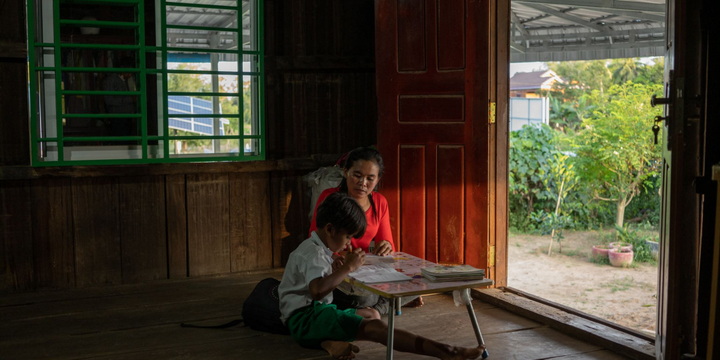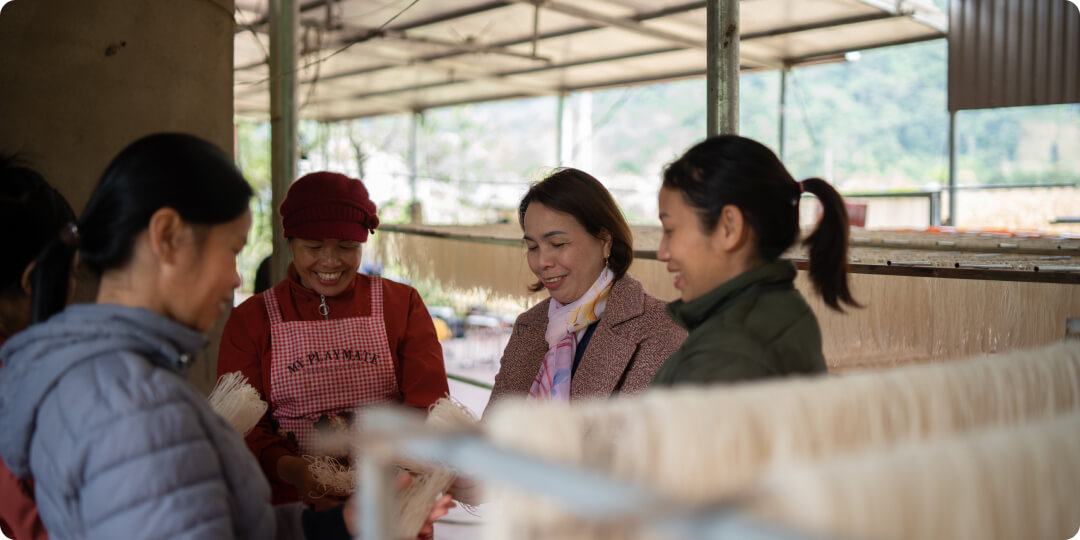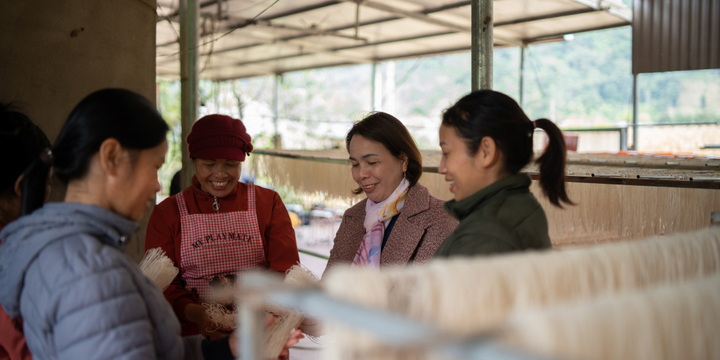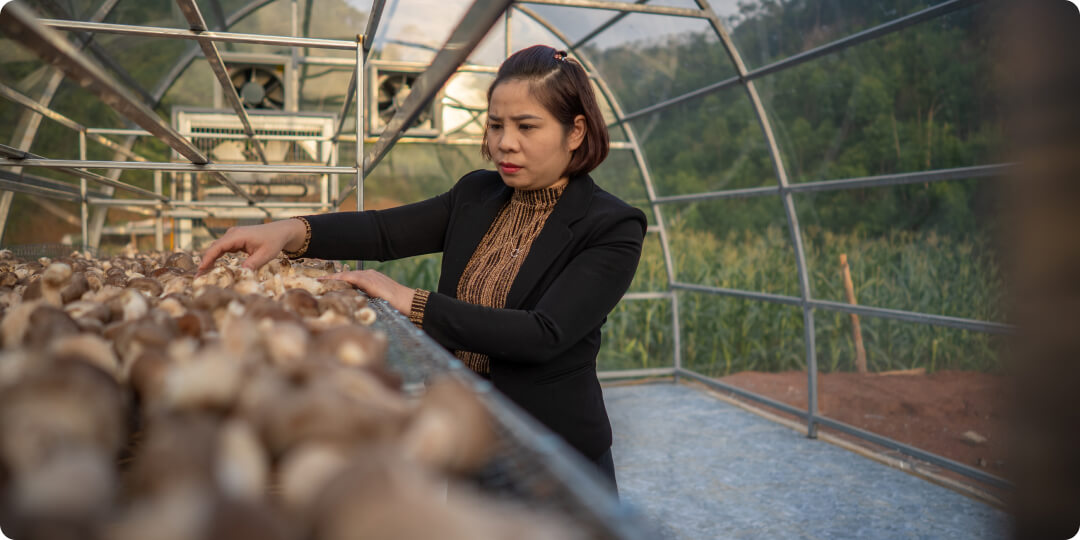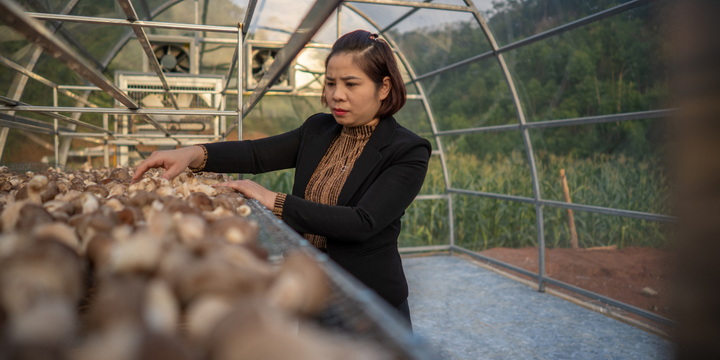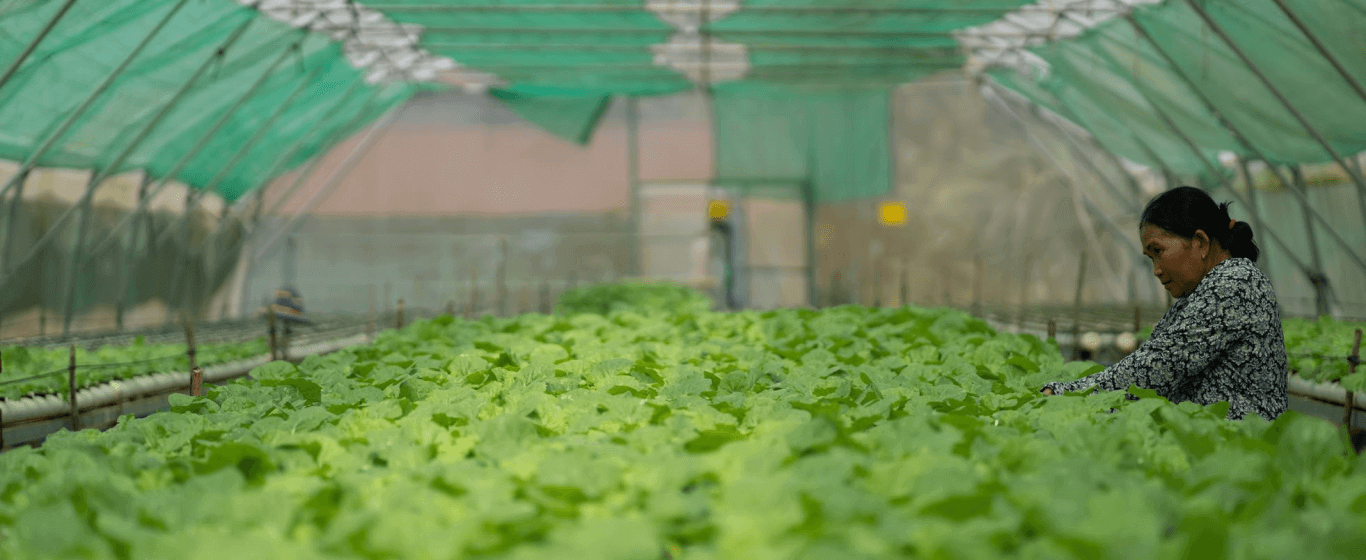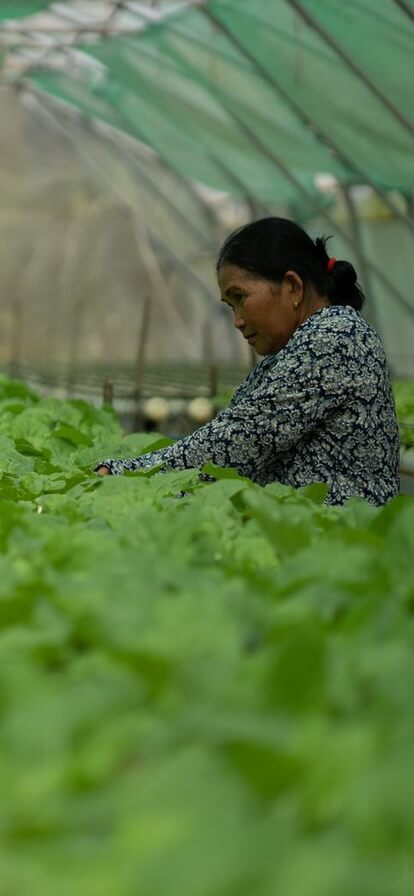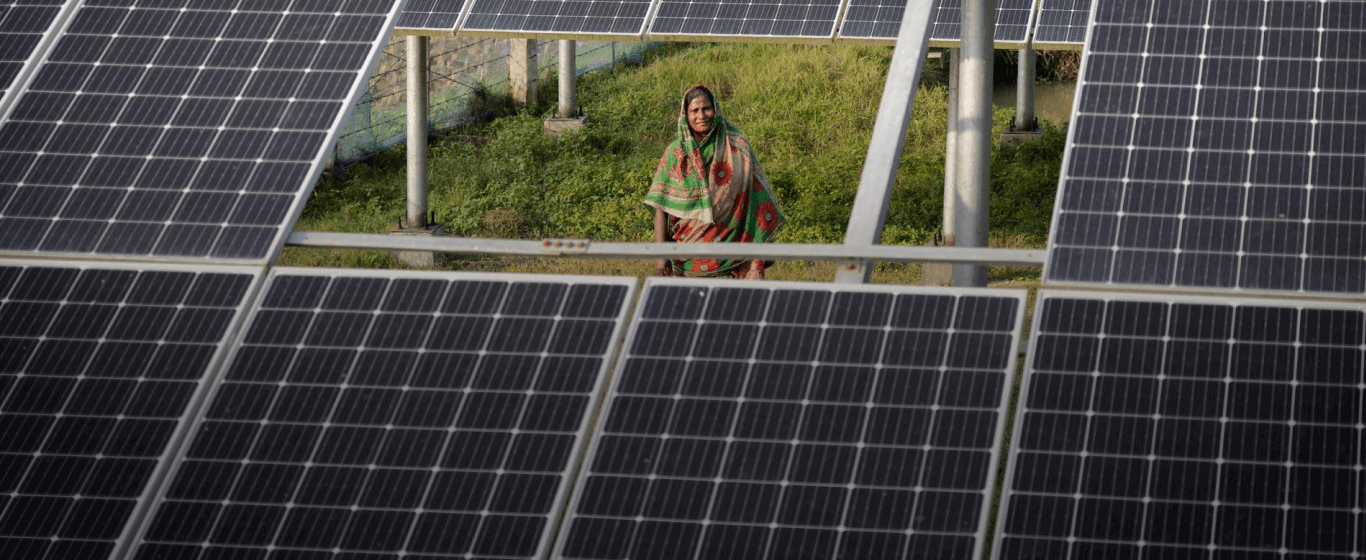Empowering women is an essential first step on the road to more just and resilient societies.
Many women in the Asia and the Pacific region have limited access to resources, education and finance. They are side-lined in decision-making processes, disproportionately impacted by disasters and are increasingly vulnerable to exploitation & violence.
people in ASEAN lack clean cooking fuels and technologies
of people displaced by global climate-related disasters are women and girls
of workers in the global renewable energy sector are women
of ministerial positions in the environmental sector are occupied by women
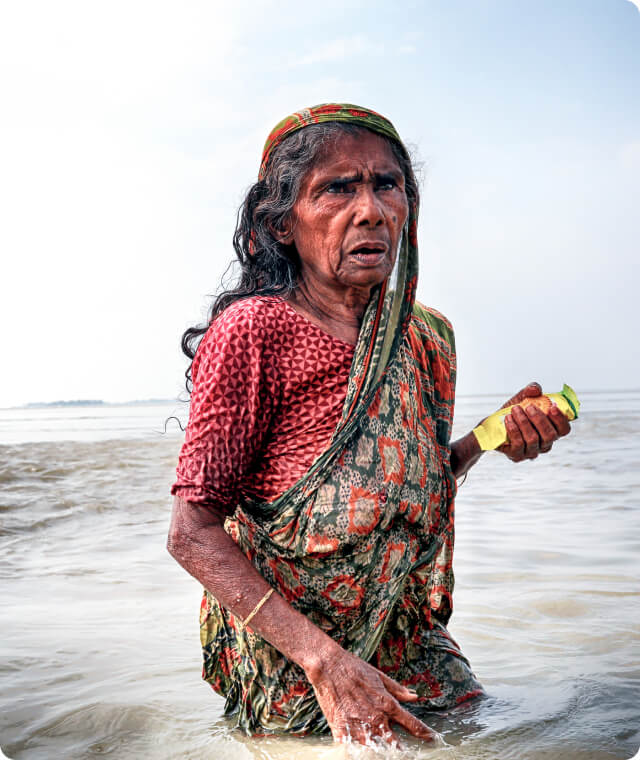
Clearly, there is a disparity in impact, agency and representation to be addressed here, and important questions need to be asked: What can be done to support women on the frontline of climate change? How can we open doors and build capacities, to create a more sustainable, more inclusive society?
Through a combination of advocacy, training and interventions, we are helping women realise their rights.
At EmPower, we use renewable energy as a way to build resilience to climate change, while also supporting green recovery in the wake of COVID-19. Through a combination of advocacy, training and interventions at ground level, we are helping women in the global south to realise their rights.
The EmPower Approach is built around 5 key outputs
Renewable energy for resilient livelihoods
Enable women to use renewable energy as economic resources for resilient livelihoods.
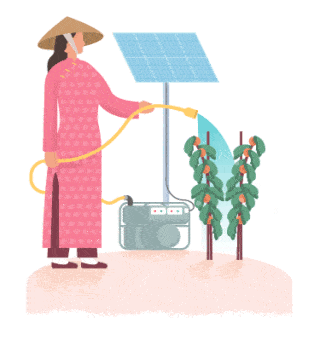
Regional knowledge sharing and decision-making
Improve regional mechanism, processes and knowledge on climate change and disaster risk reduction to include gender and human rights.
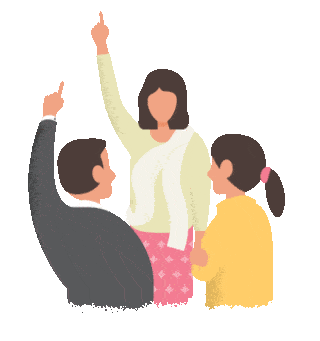
Voice and leadership
Encourage women and marginalised groups to participate in the decision-making process.
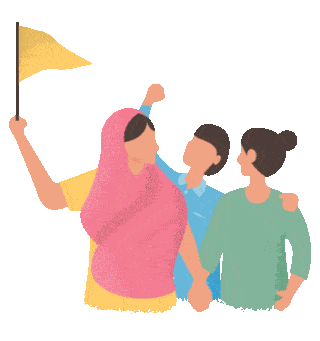
Inclusive climate, disaster risk reduction & energy policies
Improve gender responsiveness in climate and disaster risk reduction policies.
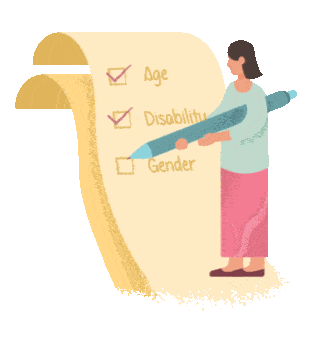
Data for decision-making
Generate, analyse and use sex, age and diversity disaggregated data to inform policy
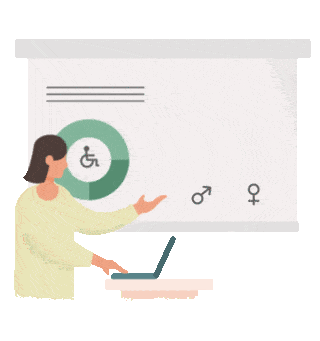
Since 2018, we have been working with a regional approach in Asia and the Pacific to support alternative livelihoods for women, while advocating for greater policy influence. We are also dedicated to delivering on the UN Sustainable Development Goals (SDGs), the Paris Agreement and the Sendai Framework.
EmPower is founded by UN Women, UN Environment Programme (UNEP) and supported by the Swedish International Development Cooperation Agency (Sida).



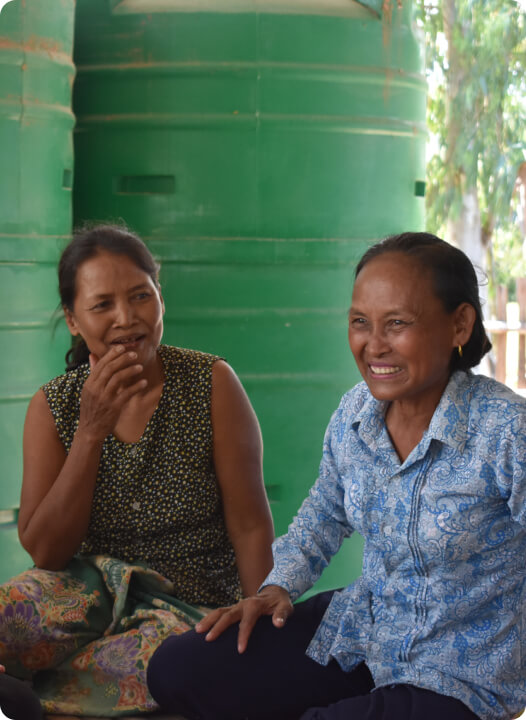
Together, we channel resources, knowledge, finance, technology, research and advocacy at the regional level, and into three target countries: Bangladesh, Cambodia and Viet Nam. Eleven other countries across the region have also been supported by this approach over the past four years.
Clean energy has the power to mitigate the impacts of climate change and provide reliable, sustainable livelihoods for women across Asia and the Pacific. For many working at the grassroots for sustainable development, it can be the key to unlocking a fairer, more equitable way of life.
Enabling women to become renewable energy entrepreneurs gives them a brighter, more climate resilient future. Our programmes are effective because they consider the specific vulnerabilities, needs and capacity of different social groups.

Maria Holtsberg
Project Manager, UN Women
Faced with the growing threat of climate change and other disasters, empowering the most vulnerable in society is an essential step towards strengthening our collective capacity to act.
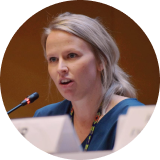
Annette Wallgren
Project Manager, UNEP
Local issues are shaped by their regional context. We’re taking a wider view.
Over the past four years, we have been helping to drive a paradigm shift in Asia and the Pacific, developing climate-resilient livelihoods for women, while also empowering them to impact policy.
Working alongside governments, NGOs, CSOs and financial institutions, we have created a network of positive developments and delivered solutions on a regional scale.
For women and communities…
- We have encouraged women and marginalised groups to participate in decision-making processes
- We have introduced renewable energy as economic resources for resilient livelihoods
- We have presented research in communities, supporting young women leaders and helping them bridge the knowledge gap
For leaders and policy makers…
- We have generated, analysed and utilised disaggregated data (SADD) to guide and inform policy interventions
- We have advanced gender responsiveness in climate and DRR policies
- We have advocated for women’s leadership in financial institutions and the renewable energy sector
EmPower Impacts
What does a more equitable and resilient society look like? We envision networks of local communities, elevated and empowered by regional support systems to meet the challenges of our time. We see women leaders as the drivers of positive change, leading their communities forward in the transition to renewable energy. We have set the wheels in motion and we are already seeing positive impacts.
gender-responsive policies and actions implemented at the regional level
in Bangladesh, Cambodia and Viet Nam have benefited from country-level interventions
have increased capacity through e-learning
intergovernmental decisions have been made, increasing commitments
have built climate-resilient livelihoods in their communities with support from EmPower
have influenced policies
Building resilience, from root to branch
Our mission is to put gender equality at the heart of climate action. Since EmPower was created in 2018, we have made significant progress on this journey, bringing our vision for the future more clearly into focus. The overarching impacts of our interventions can be seen:
In policy…
Regional intergovernmental commitments have been made, ensuring action for gender-responsive climate change, renewable energy and disaster risk reduction.

In engagement…
Regional learning opportunities have been organised to help governments and CSOs to engage on issues and advance gender equality and human rights in climate change and disaster risk reduction.

In knowledge…
Evidence-based research, tools and guidance documents have been prepared and disseminated to governments and institutions throughout Asia and the Pacific region.

In funding & financing…
To ensure that women have long-term access to credit, we have established funding mechanisms and set up investment networks, increasing national bank capacity and securing a total of USD 316,000 in co-funding.

It is imperative that we recognise the interlinkage between gender and climate change. Guided by the Declaration on the Gender-Responsive Implementation of ASEAN Community Vision 2025 and SDGs, women and girls must be empowered to play their part in responding to the impacts of environmental degradation and climate change.

Lenny Rosalin
Chair of the ASEAN Committee on Women (ACW) (2021-2022)
Pushing the frontiers of gender equality, at the frontline of climate action.
From climate change to COVID-19, global disasters can have a devastating local impact. In Bangladesh, Cambodia and Viet Nam, we have been building resilience at ground level, while also striving for improvements on a national and regional scale.
From 2018-2022, EmPower has been helping to build women’s capacity and bridge the gender gaps in education, business and politics. Our approach involves a combination of support for gender-related data collection and technical support for gender-responsive climate policies, while also working directly with local organisations to support women leaders and entrepreneurs working in renewable energy.
We have targeted three countries where help is most needed and where women’s empowerment can be the catalyst for sustainable development. In each location, the results speak for themselves.
Bangladesh
National Action Plan on "Renewable Energy and Women Entrepreneurship" developed and adopted to support women's enterprise development with renewable energy Learn more
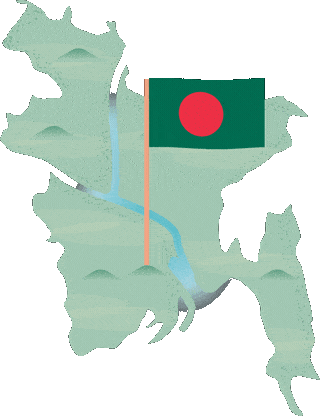
Cambodia
Stronger capacity of key line ministries on gender and climate finance, and gender mainstreaming in climate change and disaster risk reduction (DRR) for policy influence. for policy influence. Learn more
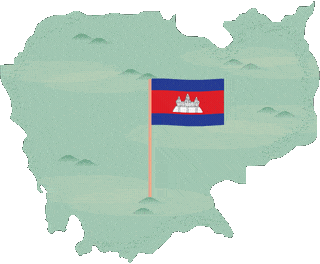
Viet Nam
Enhanced capacity of government on collection of sex, age, and disability disaggregated data. Learn more
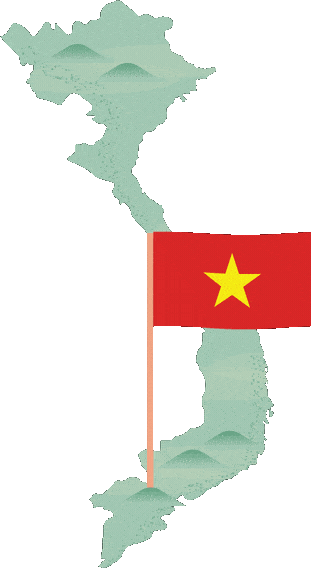
Bangladesh
Women’s empowerment is essential to community resilience in Bangladesh – one of the world’s most disaster-prone countries, and the fifth-most vulnerable to climate change, according to the World Risk Index. Here, women are statistically poorer and have less access to education, resources and livelihood opportunities.
They are also under-represented in government, with only 20.3% of seats in parliament held by women; and excluded from decision-making processes at the local level, with the majority of women and girls (59%) married off before the age of 18.
Climate policy
We have leveraged the Climate Change and Gender Action Plan (ccGAP) as a focal point for discussions with key ministries and a roadmap for gender-related climate change policies.
Capacity building and research
We have launched a series of online training platforms for women entrepreneurs using renewable energy, while also enhancing capacity and leadership for 56 women-led CSOs in five of the most climate vulnerable districts in Bangladesh.
Cambodia
In Cambodia, climate change is destabilising weather systems, decimating crops and pushing communities to the brink. In a country where 80% of women make their living from agriculture, a perfect storm is building.
To avert this disaster and build resilience, EmPower has partnered with the National Committee of Disaster Management (NCDM). We have also established provincial investment plans for renewable energy and women’s entrepreneurship in the provinces of Pursat and Takeo, while rolling out pilot interventions in Battambang, Kampong Spoe and Kampot.
Advocacy and advice
We have developed and supported the implementation guidelines for gender mainstreaming in inclusive disaster management, while also supporting the Ministry of Mining and Energy with technical inputs related to gender strategy.
Training and development
We have empowered 45 women, including government officials, through transformative leadership training. This has enabled them to participate meaningfully in climate action and disaster risk management.
Viet Nam
Viet Nam is a country of low-lying river basins, sweeping deltas and verdant coastal plains. With sea levels rising and weather systems in a state of perennial flux, these areas are increasingly vulnerable to climate change and natural disasters.
In collaboration with our partners on the ground in Viet Nam, we have strengthened gender-responsiveness in government policies, facilitated smoother and more insightful data collection, built capacity and fostered leadership in local women’s organisations.
Policy
We have supported the integration of gender equality in the National Determined Contributions (NDCs), Climate Strategy Plan and the National Adaptation Plan, while also collaborating with the ASEAN Secretariat to update the Ha Noi Recommendations on Gender in disaster risk reduction and implementation of the Sendai framework.
Data
We have been influential in the development of guidelines for the collection of sex, age and disability disaggregated data for disaster monitoring, and then actively participated in the collection of these data in five provinces.
Collaboration
We have established a network of women-focused CSOs and empowered them to advocate for gender equality in forest, waste and water management. A total of 20 CSOs have actively participated in policy discussions and activities on gender and climate change, while eight gender-responsive climate change initiatives have also been implemented at the national level.
In Bangladesh, Cambodia and Viet Nam, we have empowered women to be the driving force of change in their communities. We have collected data to inform decisions, advocated for more gender-responsive policies and provided support to entrepreneurs in the form of training and capacity building. Connected through a regional network and united by their common cause, these communities are the foundation of a more resilient future.
The journey to EmPower continues, with many more challenges ahead.
This year, we successfully wrapped up Phase I of our operations, with all major targets achieved and outputs beyond our expectations. Various actors at the national and regional levels have already committed to joining us in Phase II.
As a direct result of interventions and support from EmPower, thousands of women in Asia and the Pacific have built their resilience to climate change, COVID-19 and disasters, while the implementation of disaster risk reduction actions has addressed key drivers of gender-based vulnerabilities and enhanced human rights.
Looking back and planning ahead
Our work in the last four years has helped to bridge global knowledge gaps, with intensive training and development interventions. We have engaged in dedicated research to assess the gender-specific impacts of climate change, then leveraged this knowledge to advocate for more responsive, inclusive policies.
Milestones on our Journey
Phase I has successfully been completed, with all intended outcomes achieved or exceeded. Our work has engineered alternative livelihoods for vulnerable communities, reduced carbon emissions and sparked progressive changes to regional policy. Most importantly, it has empowered women at the grassroots level to be the advocates, architects and builders of their own development.

2,000 women economically benefiting from project interventions.

14 countries with improved climate resilience and DRR.
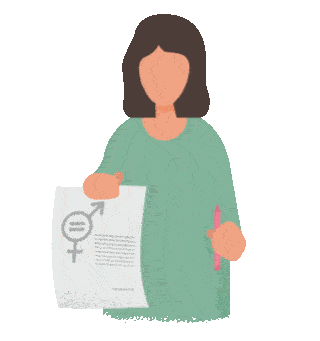
11 gender-responsive policies adopted at the regional or national level.
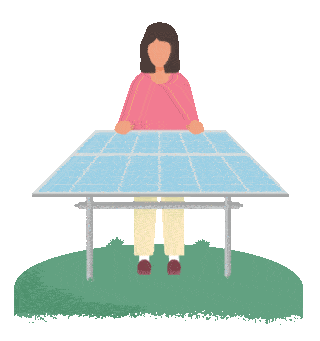
38 climate-resilient interventions implemented.
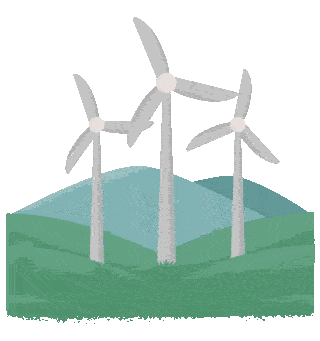
15,000 tonnes of CO2 emissions reduced through renewable energy interventions.
Although policy, training and awareness are central pillars to progress, financing remains a critical lever to enable implementation. With that in mind, we have secured finance for women-led enterprises, opened financing channels to women entrepreneurs and, crucially, ensured that a conducive financial landscape is in place, so that women in Bangladesh, Cambodia and Viet Nam can continue to benefit long after EmPower’s intervention is complete.
We’ve reached a number of major milestones with financing for Asia and the Pacific, securing USD 316,000 in co-funding, while also establishing business networks and building the capacity of national banks to support renewable energy projects. Ultimately, this means women-led businesses will continue to have access to finance into Phase II of EmPower and beyond.
What we’ve learned and where we go from here
As we look towards the future, it’s important to ask ourselves the same question that launched us on our journey: how can countries effectively implement gender-responsive climate action and disaster risk reduction to address key drivers of gender-based vulnerabilities?
Moving forward, we will continue working to provide answers to this question. We will strive to improve the lives and livelihoods of women and marginalised communities, while also advocating for a wider, holistic response to regional challenges.
As we turn the page and reflect, the following themes will be central to our story:
Co-create with partners to harness our capacities and deliver results
Make use of sub-regional platforms to scale up our impact
Amplify community voices and raise awareness of gender issues from the ground up
Monitor the commitments made and ensure results are achieved in their implementation
Institutionalise lessons learned and ensure actions can live on beyond EmPower
A message to our partners
None of our successes over the past four years would have been possible without the support we have received from our many partners. Root-and-branch action can only happen when a network of experts and advocates are united in their determination to achieve meaningful change. From the marble corridors of parliament to the bricks and mortar of rural communities, our journey these past years has been a relay involving countless runners. To everyone who has come this far with us, thank you. The journey continues.
Bangladesh
Cambodia
Viet Nam
Regional
Bangladesh
Cambodia
Viet Nam
Bangladesh
Cambodia
Viet Nam
Regional
What we know with certainty is that climate and environmental crises and disasters are escalating. When we foster and invest in women’s resilience, we are building the defences of the future as well as the assets of today. Resilience and empowerment go hand in hand.

Sima Bahous
Executive Director, UN Women
It is critical to put women at the heart of environmental decision-making. Ensuring a just transition to a green, sustainable future requires gender-responsive approaches to reorienting finance flows and economic models, and investing in resilience and capacity building.

Inger Andersen
Executive Director, UNEP


